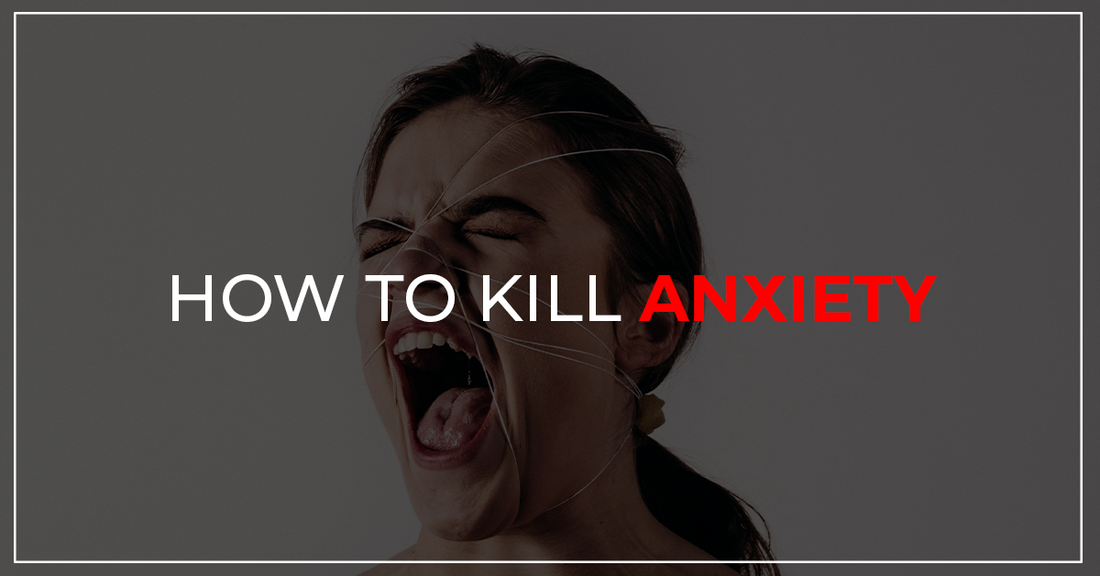
How to Kill Anxiety
Share
If you are a woman you probably know anxiety a little too much. According to the research, women suffer more from anxiety and other mental health conditions than men. What could be the reason behind this? We will know the reason in a while, first of all, what really is anxiety? And how does a common man understand it?
Anxiety is a feeling when you feel uncomfortable, fearful, or worrisome. Anxiety attacks occur in severe cases, a person gets cold sweats, racing heartbeat, and even blurry vision. Anxiety can occur in as big cases as going for a risky surgery and as small as taking a bus in the morning.
However, if you are a woman who is suffering from anxiety, we are here to help you. In this article, we will discuss the reason for anxiety in women, how harmful it is, and tips and tricks to kill anxiety.
Understanding Anxiety
Anxiety is a complex and multifaceted emotion characterized by feelings of worry, nervousness, and fear that are persistent and overwhelming. While it is a natural response to stress, for some people, anxiety can become a debilitating condition that interferes with daily life. Anxiety can manifest physically, emotionally, and mentally, causing a range of symptoms that can be distressing and disruptive.
Unlike fear, which is an emotional response to a present threat, anxiety is the anticipation of a future threat, which can be perceived as menacing or overwhelming. This anticipation can lead to physical symptoms such as rapid heartbeat, sweating, trembling, and muscle tension. Emotionally, anxiety can cause irritability, restlessness, and difficulty concentrating. Understanding these symptoms is the first step in recognizing and addressing anxiety in your life.
What is Anxiety?
Types of Anxiety Disorders
Generalized Anxiety Disorder
Generalized anxiety disorder (GAD) is a type of anxiety disorder characterized by persistent and excessive worry about everyday things, such as work, finances, health, and relationships. People with GAD often feel anxious or on edge most of the time, even when there is no apparent reason to be worried. This constant state of worry can lead to physical symptoms such as restlessness, fatigue, and difficulty sleeping.
Diagnosing GAD can be challenging because its symptoms often overlap with those of other anxiety disorders. However, a mental health professional can diagnose GAD by assessing the severity and duration of the symptoms, as well as their impact on daily life. If you find yourself constantly worrying and it’s affecting your daily activities, it might be time to seek help.
Separation Anxiety Disorder
Separation anxiety disorder involves excessive fear or anxiety about being separated from a loved one, such as a parent, child, or partner. People with this disorder may experience intense fear or anxiety when they are apart from their loved one, even for a short period. This can lead to physical symptoms such as rapid heartbeat, sweating, and trembling.
Treating separation anxiety disorder can be challenging because it often involves a deep-seated fear of abandonment or rejection. However, with the help of a mental health professional, individuals can learn coping strategies and techniques to manage their symptoms. If you or someone you know struggles with intense fear of separation, professional guidance can make a significant difference.
Other Anxiety Disorders
There are several other types of anxiety disorders, including social anxiety disorder, panic disorder, and phobias. Social anxiety disorder involves excessive fear or anxiety about social situations, such as public speaking or meeting new people. Panic disorder is characterized by recurrent panic attacks, which are intense episodes of fear or anxiety that can be debilitating. Phobias involve excessive fear or anxiety about specific objects, situations, or activities.
Each of these anxiety disorders has its unique characteristics and symptoms, but they all share a common thread - excessive and persistent fear or anxiety that interferes with daily life. With the help of a mental health professional, people with anxiety disorders can learn coping strategies and techniques to manage their symptoms and improve their quality of life. If you recognize any of these symptoms in yourself, seeking professional help is a crucial step towards better mental health.
By understanding the different types of anxiety disorders and their symptoms, you can better identify and address the specific challenges you may be facing. Remember, you are not alone, and help is available.
Why Do Women Face Generalized Anxiety Disorder?
The fact is that women have twice as many anxiety issues as men. The factors that can support this statement can be made through science and other cultural reasons as well.
Several risk factors contribute to the higher prevalence of anxiety in women, including genetic, hormonal, and environmental influences.
If we talk about science, women face more anxiety issues than men due to brain chemistry and hormone fluctuation. A woman goes through immense reproductive events in her life which also can be linked to anxiety.
Secondly, women, in general, are more sensitive than men. They have the tendency to get affected by a situation a lot more than a man. They can absorb the negative energy around them which can cause anxiety as well.
In our society, women are expected to behave a certain way. All their lives they are under strict observation of their family. No wrong move should be made. They should be perfect in every sense. These things induce anxiety in women. Wanting to please everyone around them. Either it is the parents, her children, her husband, and even her boss.
Other than that today, there are crazy beauty expectations from women. They all should look a certain way. If you talk Asian, they should have pale skin, a lean body, good height; all these factors are not under their control. However, when society builds pressure then more and more anxiety is induced in them.
How can it affect you with physical symptoms?
A woman living with anxiety can never live a healthy life. It affects your everyday routine. Moreover, anxiety can affect your relationship with others.
During an anxiety attack a person’s heart rate increases, and blood starts flowing to the brain. It causes light-headedness and nausea.
A woman who is facing anxiety is more vulnerable to other mental health conditions such as OCD, Social Anxiety, PTSD, etc. Other than that, facing anxiety for a long time can badly affect one’s immune system; they can catch illness more easily than a normal person. Anxiety also causes eating disorders which can lead to weight gain.
Tips and Tricks To Treat Anxiety Disorders
By now, you must also be looking for a solution. What can I do to avoid anxiety? Well, let us tell you, when there is a will there’s the way. So, you have to keep trying to fight this disorder.
One effective treatment option for managing anxiety is talk therapy. This form of psychotherapy can help individuals understand and manage their anxiety symptoms.
Here are some tips to help you through:
Avoid situations that induce social anxiety disorder
This tip is as simple as it sounds. If you are a student and you get exam anxiety. Prepare everything beforehand instead of pulling all-nighters as it induces anxiety. If you feel negative energy at a place or a group of people, simply avoid them. Your inner peace is more important. If you feel anxious about reaching a place on time, keep a margin when you leave your house.
Meditate
Meditation is of key importance. You can meditate through yoga or practising your religious beliefs. Just empty your mind and have a mindfulness exercise. It has proven to improve all psychological disorders.
Exercise in nature
There are two factors here, exercise and that too in nature. Exercise automatically improves your mood. It is good for your physical as well as mental health. Stay close to nature and do breathing exercise; it can help you while you are having an anxiety attack as well.
Drink lots of water
This is our tried and tested method. As soon as you feel that anxiety is about to kick in, drink water. Water helps to wash all the negative feelings away. So, keep a bottle with you during your exam as well.
Have a goodnight's sleep
A full-term 6-8 hours of sleep should be your top priority. Those chores can wait till morning but you can never replace a goodnight's sleep. So choose your most comfortable nightwear, drink warm milk and get in bed. Comfortable and breathable pyjamas and a warm drink can help you with a sound sleep.
These are some of the tips and tricks that all women can follow to kick away anxiety. Remember to always put yourself first and then anybody else.
